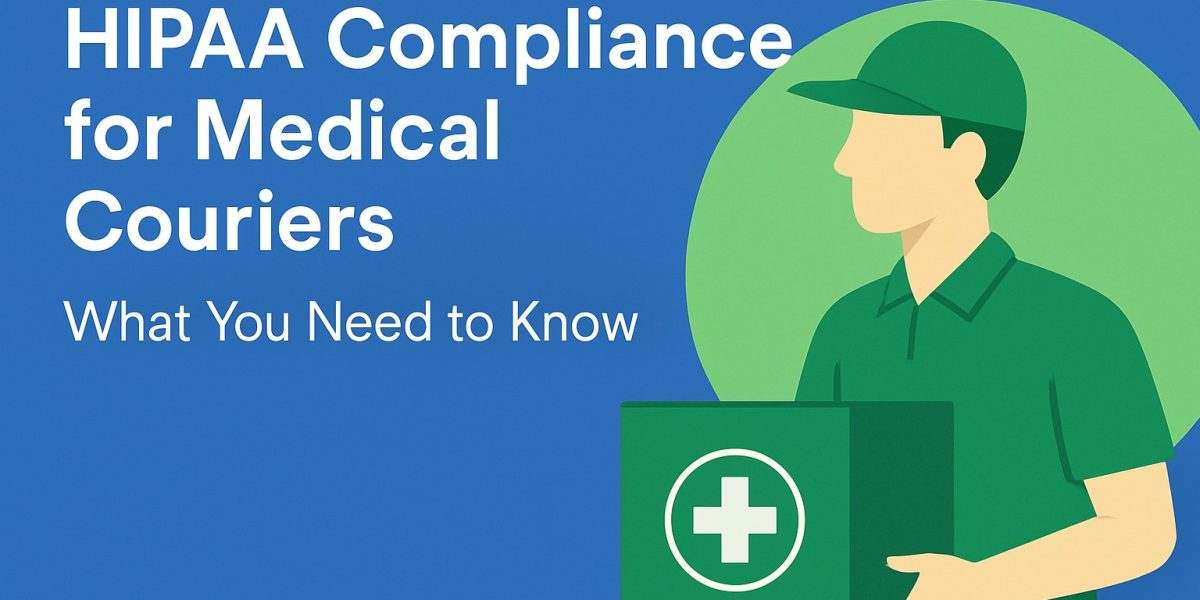In the fast-paced world of healthcare, medical couriers play a critical role in ensuring timely and secure deliveries of lab samples, prescriptions, medical records, and other sensitive materials. However, transporting protected health information (PHI) comes with strict legal responsibilities under HIPAA compliance.
Failure to adhere to healthcare delivery regulations can result in severe penalties, including fines and reputational damage. Whether you’re a medical courier service or a healthcare provider outsourcing deliveries, understanding courier HIPAA guidelines is essential for maintaining patient data security and avoiding violations.
This guide covers everything you need to know about HIPAA compliance for medical couriers, including key regulations, best practices, and necessary HIPAA training to stay compliant.
Why HIPAA Compliance Matters for Medical Couriers
The Health Insurance Portability and Accountability Act (HIPAA) sets national standards for protecting sensitive patient data. While HIPAA primarily applies to healthcare providers, insurers, and business associates, medical couriers fall under this umbrella when handling PHI.
Key Risks of Non-Compliance
- Heavy fines (up to $50,000 per violation)
- Legal action from affected patients or healthcare providers
- Loss of contracts with hospitals, labs, and clinics
- Reputation damage in the healthcare industry
Since medical logistics involves transporting PHI—such as lab results, prescriptions, and patient records—couriers must follow strict protocols to prevent breaches.
Understanding Protected Health Information (PHI) in Medical Courier Services
Protected Health Information (PHI) includes any data that can identify a patient, such as:
- Patient names, addresses, and birth dates
- Medical records and lab results
- Prescription details
- Insurance information
Even seemingly minor details, like a patient’s pickup location or tracking number, can qualify as PHI if linked to medical data
Common PHI Handled by Medical Couriers
- Blood samples and lab specimens
- X-rays and MRI scans
- Prescription medications
- Medical equipment with patient identifiers
Since couriers frequently handle these items, they must ensure patient data security at every stage—pickup, transit, and delivery.
HIPAA Compliance Requirements for Medical Couriers
To maintain compliance, medical delivery services must implement the following safeguards:
1. Administrative Safeguards
- HIPAA Training: All couriers must complete HIPAA compliance training to understand PHI handling, breach reporting, and security protocols.
- Signed Business Associate Agreements (BAAs): If a courier service works with healthcare providers, a BAA is required to outline PHI protection responsibilities.
- Risk Assessments: Regular audits should identify vulnerabilities in data handling and transportation.
2. Physical Safeguards
- Secure Storage: PHI must be stored in locked compartments during transit.
- Tamper-Proof Packaging: Use sealed, opaque bags or containers to prevent unauthorized access.
- Chain of Custody Logs: Document every handoff to ensure accountability.
3. Technical Safeguards
- Encrypted Tracking Systems: Delivery tracking software should encrypt PHI to prevent hacking.
- Secure Communication: Disposable waybills or digital systems should avoid exposing patient details.
- Access Controls: Only authorized personnel should handle PHI.
Best Practices for HIPAA-Compliant Medical Courier Services
1. Partner with HIPAA-Compliant Couriers
Healthcare providers should only work with medical couriers that:
- Sign BAAs
- Provide proof of HIPAA training
- Use secure vehicles with GPS tracking
2. Minimize PHI Exposure
- Redact unnecessary patient details from shipping labels.
- Use coded identifiers instead of full patient names.
3. Train Employees Regularly
- Annual HIPAA training refreshers keep couriers updated on regulations.
- Simulated breach drills help teams respond effectively to data leaks.
4. Implement Secure Delivery Protocols
- Require recipient signatures for PHI deliveries.
- Verify identities before releasing sensitive packages.
5. Use Technology for Compliance
- Electronic Proof of Delivery (ePOD) systems with audit trails.
- Temperature-controlled transport for sensitive medical specimens.
What Happens If a HIPAA Breach Occurs?
Despite precautions, breaches can happen—lost packages, unauthorized access, or cyberattacks. If PHI is compromised:
Report the Breach
- Notify the healthcare provider and affected patients within 60 days.
- File a report with the U.S. Department of Health and Human Services (HHS) if 500+ patients are affected.
Investigate & Remediate
- Identify how the breach occurred.
- Strengthen security measures to prevent future incidents.
Legal & Financial Consequences
- Fines range from 100to100to50,000 per violation.
- Repeated violations can lead to criminal charges.
Choosing a HIPAA-Compliant Medical Courier Service
Not all couriers meet healthcare compliance standards. When selecting a provider, ask:
- Do they sign BAAs? (Mandatory for HIPAA compliance)
- What security measures do they use? (Encryption, tamper-proof bags, GPS tracking)
- Is staff trained in HIPAA protocols? (Proof of training should be available)
Reputable medical logistics companies will have documented policies for PHI protection.
Final Thoughts: Staying Compliant in Medical Courier Services
HIPAA compliance isn’t optional—it’s a legal and ethical obligation for medical couriers. By implementing strict patient data security measures, conducting regular HIPAA training, and following courier HIPAA guidelines, delivery services can safeguard PHI and maintain trust with healthcare partners.
For healthcare providers, verifying a courier’s compliance before outsourcing deliveries is crucial. A single breach can lead to massive penalties, making HIPAA-compliant medical logistics a non-negotiable requirement.
By staying informed and proactive, medical couriers can ensure safe, secure, and legally compliant healthcare deliveries.







